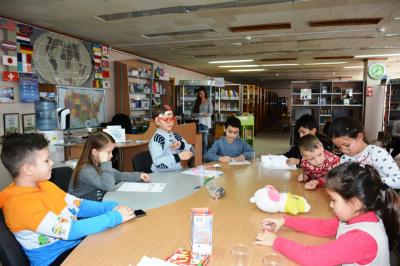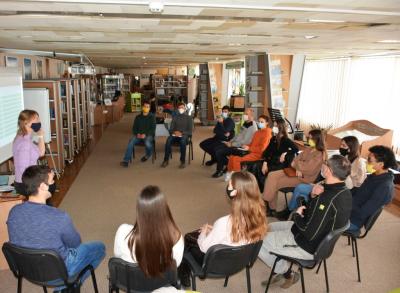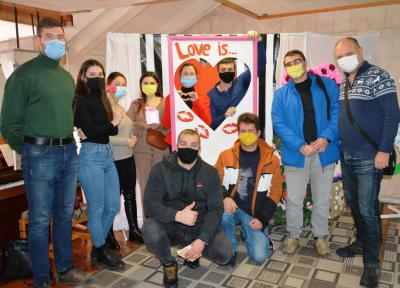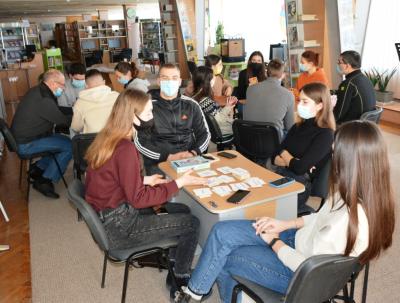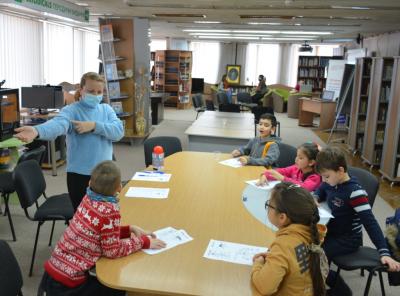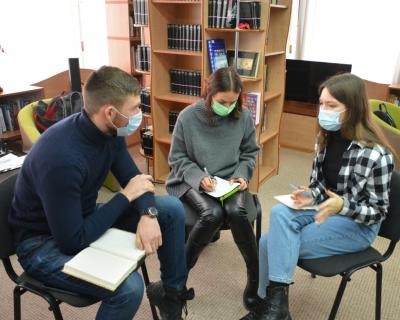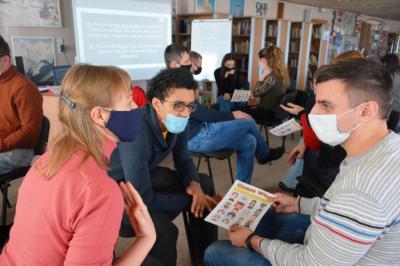Christiane Amanpour
Christiane Amanpour
1958-
War Correspondent
'Wbu spend the whole day watch-W ing people die, and there d jujt no escape from it. ltd so awful that in the end you just can't describe it. But 1 have to try. That's the job.
— Christiane Amanpour
Christiane Amanpour was still settling into her new post as CNN's foreign correspondent in Frankfurt, Germany. Within a few months of her arrival, the biggest story of the year began, but it wasn't happening in Germany. Saddam Hussein of Iraq ordered tanks and troops into the neighboring country of Kuwait. The Iraqis quickly stormed the capital, toppled the government, and claimed Kuwait as an extension of Iraq. The United Nations Security Council demanded Iraq's withdrawal, and the United States pledged to come to Kuwait's assistance if Iraq didn't withdraw.
Christiane did what journalists do. She hopped on a plane and was at Kuwait's border within hours. Over the next several months, as tensions in the area increased, Christiane kept CNN's international audience up to date on the explosive situation.
The deadline for Iraq's withdrawal came and went. Iraq held firm. The United States launched Operation Desert Storm. Chnstiane's face and her crisp British accent became familiar to millions of Americans who kept their television sets tuned to CNN all through the short but brutal Persian Gulf War.
Since the Gulf War, Christiane has became CNN's roving correspondent. Like most war correspondents, Christiane thrives on danger. She was the first international correspondent to provide concentrated coverage on the fierce struggle between the Moslems and the Serbs in Bosma-Herzegovma. Her coverage of this war won her four of journalism's highest honors: the George Foster Peabody Award, the George Polk Memorial Award, the Alfred I. DuPont-Columbia University Silver Baton, and the 1994 Courage in Journalism Award presented by International Women's Media Foundation.
Since 1989, she has covered heart-wrenching stones of war in Rwanda and the rescue of thousands of starving children in Somalia. She was in Haiti when United States troops landed to prevent violence from erupting on that island. In fact, wherever violence erupts, Christiane is there, camera in hand, giving mmute-by-minute reports.
Christiane was born in London, the oldest of four daughters of an Iranian businessman and a British mother. At that time, Iran was an oil-rich country run by the shah, who was friendly to the West. The Amanpours moved to Iran a few months after their daughter's birth. As a young child, Christiane enjoyed her family's position of -wealth and prestige. When she was eleven years old, she and her sisters were sent to England to attend school. Christiane was unhappy and homesick. She had dreamed of one day becoming a doctor, but she was unable to get into medical school due to her poor grades.
Her initial decision to study journalism came about in a strange way. One of her sisters had been accepted by a journalism college in London, then changed her mind. The college refused to refund the tuition, so Christiane went in her sister's place.
Then, in 1979, Iran was thrown into turmoil. The shah of Iran was deposed by the Ayatollah Khomeini, a religious extremist who took over the country, and ended all relations with the West.
Christiane's parents returned to London, having to leave all their possessions and money behind. It was after this experience that Christiane decided she wanted to become a foreign correspondent. "If I was going to be affected by events, I wanted to be a part of them," she later said. She wanted to better understand why such things happened in the world and explain them to others.
She then came to the United States to continue her journalism studies at the University of Rhode Island. Shortly after her graduation in 1983, she applied for a position at CNN. Though Christiane began as an assistant, answering phones and typing scripts, she told everyone at the network she wanted to be a foreign correspondent. Her boss told her this was unhkely to happen, but Christiane said, "Just wait!"
During the summer of 1984, Christiane, on her own initiative, went to California to cover the Democratic National Convention. The following year, CNN did a special series on Iran. Christiane's Iranian background and knowledge helped to make that special a success. She was making herself a valuable member of the CNN team, and it wasn't long before she was rewarded with promotions that led to her appointment in Frankfurt.
It was largely Christiane's coverage of the Gulf War that catapulted CNN's ratings and made the network as successful as it is today. In fact, in the wake of CNN's phenomenal success, the regular networks have changed their news formats to include more frequent updates of breaking news and round-the-clock coverage for big stories.
Today Christiane lives in Paris and chooses assignments that take her around the world. She is a powerful and influential member of the news community since her choices determine what CNN viewers watch. This power was clearly demonstrated with her coverage of the war in Bosnia and Herzegovina. Until Christiane's intense coverage of this struggle, the rest of the world had paid little attention to it.
Asked about her own status as one of only a few women war correspondents, Chnstiane acknowledges the debt she owes to her predecessors. "Women before me have forged the path," she said. She also feels being a woman is an advantage because, "People open up to you more than they would to a man."
This information is only for education purpose, and was taken from ' Extraordinary Women Journalists' by Claire Price-Groff.- Children's Press, USA

